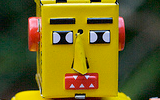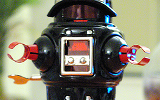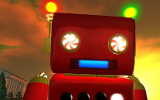Exhibition Naked on Pluto, MU, Eindhoven (NL)



Exhibition ‘Funware’, 12 November 2010 – 16 Januari 2011, MU, Eindhoven
Naked on Pluto is part of the exhibition ‘Funware’, the opening is Friday November 12 at 20.00.
Funware
Adrian Ward, Amy Alexander, Annina Ruest, Bob Zimbinski, Carmen Weisskopf / Domagoj Smoljo / Roger Wigger, Christoph Haag / Franziska Windisch / Ludwig Zeller / Martin Rumori, Colin Green / Matthew Fuller / Simon Pope, Dave Griffiths, Dave Griffiths / Aymeric Mansoux / Marloes de Valk, David Link, Electroboutique, Gazira Babeli, Joan Leandre, JODI, Jon Satrom / Ben Syverson, RTmark, Runme.org.
Making and using software can be experimental, humorous and aesthetically rich. Alongside today’s rather dull omnipresence of databases and content management systems, elements of fun have actually informed and guided the development of software from its beginnings. Fun is the energy of curiosity and inappropriateness, exploring what is not yet known in art, culture, computer science, design, math and the site of their encounter: software. Here, software art, a joke of a mathematical genius and amateur tinkering of software stand side by side.
Freaks run the world. It is through fun that they invent what becomes our reality, even if their jokes are later updated to guide matters in unappetizing ways. Our society is built and managed by software. To understand how we can act in relation to such systems and how they are made, we need to get a sense of the energy that drives software, the energy based on fun. We can come closer to these practices through the territories that are in-between geeky humour, digital folklore, cultures of using conventional software, artistic software and history of computation. It is in the fact that exploration takes place through fun and the bizarre territories always exist that there is a hope for an open horizon.
The exhibition Funware questions, tangles and experiments with the materiality of software, the backbone of contemporary society. Letting us deal with the glitchy nature of human-machine ensembles, it offers a way of understanding something that is normally hidden and serious. Fun is far from detaching software from political or social interrogability, it is rather a force and a method that works on complicating the normal, the serious and the dominant.
Starting off with the reconstruction of an algorithm from the 1950-s, Funware references home scripting of the 1980-s, early fascination with ASCII, geeky humour, deconstructed games, classic software art and goes on to include an i-Phone sculpture and an i-Pad application.
Performed by amateurs, artists, alternative coders or professional programmers for “fun”, enquiries into software as aesthetic and political practice let us see the uncertainty and seamfullness of software in times when the dominant tendencies is to hide its operation behind security systems, impenetrable interfaces and shiny entertainment.
Fun in software is a way to construct and recognize the complexity of software as embedded in between art, folklore, industry, and university. It is about breaking from systems of constraints in ways that produce richness and abundance of kinds. Funware offers a way to re-address software, as an invisible universal culture, in its aesthetics, history, and power.
Curator: Olga Goriunova
Executive producers: aaaan.net
Supported by: VSBfonds, SNS Reaal, London Metropolitan University & STRP Festival